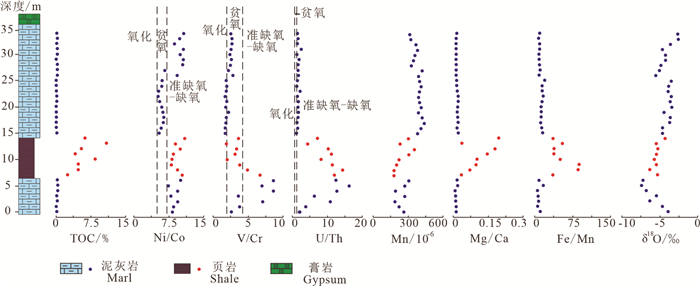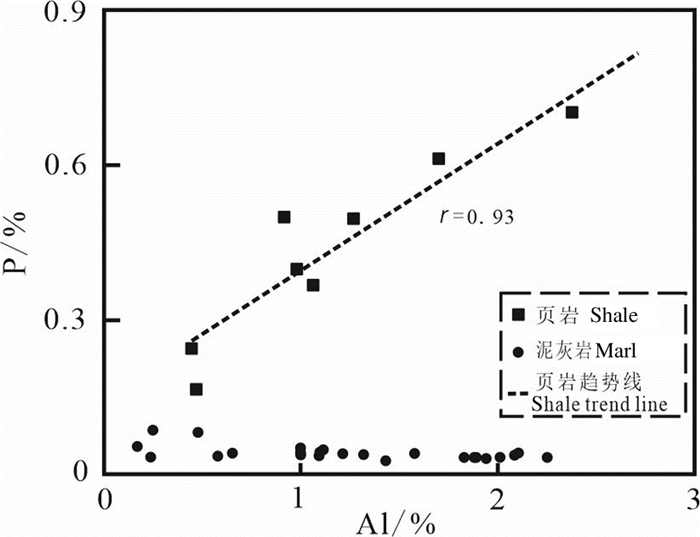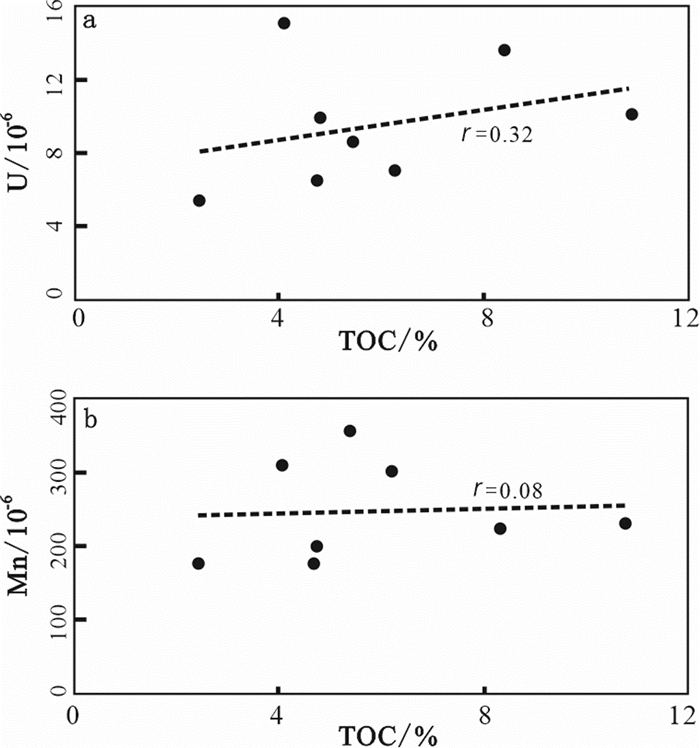Mechanism of organic matter accumulation in a marine-terrestrial transitional residual bay environment: A case of Early Cretaceous organic-rich shales in the Qiangtang Basin
-
摘要:
研究目的 羌塘盆地从海相向陆相转换的过程中,形成了残留海湾盆地,该过渡沉积环境能够形成富有机质的页岩,由于其生物母源复杂,有机质富集机理尚不清楚。
研究方法 本文选择长梁山地区残留海湾环境沉积的页岩,开展有机质富集机理研究。EF值、Mn含量、U/Th等氧化还原指标揭示页岩沉积期水体为次还原—还原环境,生物钡含量指示水体具有较低的初始生产力。
研究结果 氧同位素、Mg/Ca、Fe/Mn等气候指标表明页岩沉积期发生了明显的气候变化,由泥灰岩沉积期的干燥寒冷转换为页岩沉积期的温暖潮湿。
结论 结合相对较快的沉积速率及页岩以Ⅱ型干酪根为主的情况,长梁山页岩的有机质富集可能与温暖潮湿的气候条件、相对较快的沉积速率和高的陆源有机质输入有关。
Abstract:This paper is the result of oil and gas exploration engineering.
Objective Residual bay basin was developed during the transition from marine to continental deposition in the Qiangtang Basin. This transition environment enables Qiangtang Basin to generate organic-rich shales. The mechanism of organic matter accumulation is still controversial due to its complicated organism origin.
Methods In this study, we choose residual bay organic-rich shales from the Changliangshan section to study the mechanism of organic material accumulation. Redox-sensitive indices including EF values, Mn contents and U/Th ratios reveal that the water volume was dyoxic to anoxic condition during the shale deposition. The relatively low primary productivity during deposition is supported by the relatively low biogenic barium concentrations.
Results Climate change indices including oxygen-isotope, Mg/Ca and Fe/Mn ratio show that a significant climatic change has taken place during the shale deposition. Climate has changed into warm and humid during the shale deposition compared with dry and cold during underlying marl deposition.
Conclusions Combined with sedimentary rate and type Ⅱ kerogen, this paper proposed that warm and humid climate conditions, relatively high sedimentation rate, and high input from terrigenous higher plants are the main factors controlling organic matter accumulation in the Changliangshan shales.
-

-
表 1 长梁山地区样品TOC及主量元素含量(%)
Table 1. Contents of TOC and major elements in samples from the Changliangshan section (%)

表 2 长梁山地区泥岩样品微量元素含量(10-6)
Table 2. Contents of trace elements in samples from the Changliangshan section (10-6)

表 3 长梁山地区样品稀土元素含量(10-6)
Table 3. Contents of rare earth elements in samples from the Changliangshan section (10-6)

-
Algeo T J, Maynard J B. 2004. Trace-element behavior and redox facies in core shales of Upper Pennsylvanian Kansas- type cyclothems[J]. Chemical Geology, 206(3/4): 289-318.
Algeo T J, Ingall E. 2007. Sedimentary Corg: P ratios, paleocean ventilation, and Phanerozoic atmospheric pO2[J]. Palaeogeography Palaeoclimatology Palaeoecology, 256(3/4): 130-155.
Algeo T J, Heckel P H. 2008. The Late Pennsylvanian Midcontinent Sea of North America: A review[J]. Palaeogeography, Palaeoclimatology, Palaeoecology, 268(3/4): 205-221.
Algeo T J, Rowe H. 2012. Paleoceanographic applications of trace-metal concentration data[J]. Chemical Geology, 324/325: 6-18. doi: 10.1016/j.chemgeo.2011.09.002
Böning P, Brumsack H J, Böttcher M E, Schnetger B, Kriete C, Kallmeyer J, Borchers S L. 2004. Geochemistry of Peruvian near-surface sediments[J]. Geochimica et Cosmochimica Acta, 68(21): 4429-4451. doi: 10.1016/j.gca.2004.04.027
Cao J, Yang R F, Yin W, Hu G, Bian L Z, Fu X G. 2018. Mechanism of organic matter accumulation in residual bay environments: The Early Cretaceous Qiangtang Basin, Xizang[J]. Energy & Fuels, 32: 1024-1037.
Doner Z, Kumral M, Demirel I H, Hu Q H. 2019. Geochemical characteristics of the Silurian shales from the central Taurides, southern Turkey: Organic matter accumulation, preservation and depositional environment modeling[J]. Marine and Petroleum Geology, 102: 155-175. doi: 10.1016/j.marpetgeo.2018.12.042
Dymond J, Suess E, Lyle M. 1992. Barium in deep sea sediments: A geochemical proxy for paleoproductivity[J]. Paleoceanography, 7(2): 163-181. doi: 10.1029/92PA00181
Föllmi K B. 2012. Early Cretaceous life, climate and anoxia[J]. Cretaceous Research, 35: 230-257. doi: 10.1016/j.cretres.2011.12.005
Fu Xiugen, Wang Jian, Wang Zhengjiang, Chen Wenxi. 2007. Marine oil shale depositional environment of Qiangtang Basin in Northern Xizang[J]. Xinjiang Petroleum Geology, 28(5): 529-533(in Chinese with English abstract).
Fu X G, Wang J, Qu W J, Duan T Z, Du A D, Wang Z J, Liu H. 2008. Re-Os (ICP-MS) dating of marine oil shale in the Qiangtang basin, northern Xizang, China[J]. Oil Shale, 25(1): 47-55. doi: 10.3176/oil.2008.1.06
Fu X G, Wang J, Zeng Y H, Li Z X, Wang Z J. 2009. Geochemical and palynological investigation of the Shengli River marine oil shale (China): Implications for paleoenvironment and paleoclimate[J]. International Journal of Coal Geology, 78(3): 217-224. doi: 10.1016/j.coal.2009.02.001
Fu X G, Tan F W, Feng X L, Wang D, Chen W B, Song C Y, Zeng S Q. 2014. Early Jurassic anoxic conditions and organic accumulation in the eastern Tethys[J]. International Geology Review, 56(12): 1450-1465. doi: 10.1080/00206814.2014.945103
Fu X G, Wang J, Chen W B, Feng X L, Wang D, Song C Y, Zeng S Q. 2015. Organic accumulation in lacustrine rift basin: Constraints from mineralogical and multiple geochemical proxies[J]. International Journal of Earth Sciences, 104(2): 495-511. doi: 10.1007/s00531-014-1089-3
Fu X G, Wang J, Wen H G, Wang Z W, Zeng S Q, Song C Y, Wang D, Nie Y. 2020. Carbon-isotope record and paleoceanographic changes prior to the OAE 1a in the Eastern Tethys: Implication for the accumulation of organic- rich sediments[J]. Marine and Petroleum Geology, 113: 104049. doi: 10.1016/j.marpetgeo.2019.104049
Godet A, Bodin S, Föllmi K B, Vermeulen J, Gardin S, Fiet N, Adatte T, Berner Z, Stüben D, Van de Schootbrugge B. 2006. Evolution of the marine stable carbon- isotope record during the early Cretaceous: A focus on the late Hauterivian and Barremian in the Tethyan realm[J]. Earth and Planetary Science Letters, 242: 254-271. doi: 10.1016/j.epsl.2005.12.011
Gromet L P, Dymek R F, Haskin L A, Korotev R L, 1984. The "North American shale composite": Its compilation, major and trace element characteristics[J]. Geochimica et Cosmochimica Acta, 48(12): 2469-2482. doi: 10.1016/0016-7037(84)90298-9
Guo Xusheng, Hu Dongfeng, Wen Zhidong, Liu Ruobing. 2014. Major factors controlling the accumulation and high productivity in marine shale gas in the Lower Paleozoic of Sichuan Basin and its periphery: A case study of the Wufeng-Longmaxi Formation of Jiaoshiba area[J]. Geology in China, 41(3): 893-901(in Chinese with English abstract).
Huck S, Heimhofer U, Immenhauser A, Weissert H. 2013. Carbon-isotope stratigraphy of Early Cretaceous (Urgonian) shoal-water deposits: Diachronous changes in carbonate-platform production in the north-western Tethys[J]. Sedimentary Geology, 290: 157-174. doi: 10.1016/j.sedgeo.2013.03.016
Ibach L E J. 1982. Relationship between sedimentation rate and total organic carbon content in ancient marine sediments[J]. AAPG Bulletin, 66: 170-188.
Ingall E D, Bustin R M, Van Cappellan P. 1993. Influence of water column anoxia on the burial and preservation of carbon and phosphorus in marine shales[J]. Geochimica et Cosmochimica Acta, 57(2): 303-316. doi: 10.1016/0016-7037(93)90433-W
Jones B, Manning D A C. 1994. Comparison of geochemical indices used for the interpretation of palaeoredox conditions in ancient mudstones[J]. Chemical Geology, 111(1/4): 0-129.
Kapp P, Yin A, Manning C E, Murphy M, Harrison T M, Spurlin M, Ding L, Deng X G, Wu C M. 2000. Blueschist-bearing metamorphic core complexes in the Qiangtang block reveal deep crustal structure of northern Xizang[J]. Geology, 28(1): 19-22. doi: 10.1130/0091-7613(2000)28<19:BMCCIT>2.0.CO;2
Kryc K A, Murray R W, Murray D W. 2003. Elemental fractionation of Si, Al, Ti, Fe, Ca, Mn, P, and Ba in five marine sedimentary reference materials: Results from sequential extractions[J]. Analytica Chimica Acta, 487(1): 117-128. doi: 10.1016/S0003-2670(03)00492-6
Li Qiqi, Xu Shang, Chen Ke, Song Teng, Meng Fanyang, He Sheng, Lu Yongchao, Shi Wanzhong, Gou Qiyang, Wang Yuxuan. 2022. Analysis ofshale gas accumulation conditions of the Upper Permian in the Lower Yangtze Region[J]. Geology in China, 49(2): 383-397 (in Chinese withEnglish abstract).
Lipinski M, Warning B, Brumsack H J. 2003. Trace metal signatures of Jurassic/Cretacious black shales from the Norwegian shelf and the Barents Sea[J]. Palaeogeography, Palaeoclimatology, Palaeoecology, 190(1): 459-475.
Montero-Serrano J C, Föllmi K B, Adatte T, Spangenberg J E, Tribovillard N, Fantasia A, Suan G. 2015. Continental weathering and redox conditions during the early Toarcian oceanic anoxic event in the northwestern Tethys: Insight from the posidonia shale section in the Swiss Jura Mountains[J]. Palaeogeography Palaeoclimatology Palaeoecology, 429: 83-99. doi: 10.1016/j.palaeo.2015.03.043
Murray R W, Leinen M. 1993. Chemical transport to the seafloor of the equatorial Pacific Ocean across a latitudinal transect at 135°W: Tracking sedimentary major, trace, and rare earth element fluxes at the Equator and the Intertropical Convergence Zone[J]. Geochimica et Cosmochimica Acta, 57(17): 4141-4163. doi: 10.1016/0016-7037(93)90312-K
Paytan A, Kastner M, Chavez F P. 1996. Glacial to interglacial fluctuations in productivity in the equatorial Pacific as indicated by marin[J]. Science, 274(5291): 1355-1357. doi: 10.1126/science.274.5291.1355
Quinby-Hunt M S, Wilde P. 1994. Thermodynamic zonation in the black shale facies based on iron-manganese-vanadium content[J]. Chemical Geology, 113(3/4): 297-317.
Rimmer S M. 2004. Geochemical paleoredox indicators in Devonian-Mississippian black shales, Central Appalachian Basin (USA)[J]. Chemical Geology, 206(3/4): 373-391.
Ross D J K, Bustin R M. 2009. Investigating the use of sedimentary geochemical proxies for paleoenvironment interpretation of thermally mature organic- rich strata: Examples from the Devonian- Mississippian shales, Western Canadian Sedimentary Basin[J]. Chemical Geology, 260: 1-19. doi: 10.1016/j.chemgeo.2008.10.027
Schenau S J, Reichart G J, De Lange G J. 2005. Phosphorus burial as a function of paleoproductivity and redox conditions in Arabian Sea sediments[J]. Geochimica et Cosmochimica Acta, 69(4): 919-931. doi: 10.1016/j.gca.2004.05.044
Schoepfer S D, Shen J, Wei H, Tyson R V, Ingall E, Algeo T J. 2015. Total organic carbon, organic phosphorus, and biogenic barium fluxes as proxies for paleomarine productivity[J]. Earth Science Reviews, 149: 23-52. doi: 10.1016/j.earscirev.2014.08.017
Shang Fei, Zhou Haiyan, Liu Yong, Zhou Xuexian, Wang Lan, Bi He, Wang Guochang, Song Li, Chen Ruiqian. 2020. A discussion on the organic matter enrichment model of the Nenjiang Formation, Songliao Basin: A case study of oil shale in the 1st and 2nd members of the Nenjiang Formation[J]. Geology in China, 47(1): 236-248(in Chinese with English abstract).
Shen J, Schoepfer S D, Feng Q, Zhou L, Yu J X, Song H Y, Wei H Y, Algeo T J. 2015. Marine productivity changes during the end-Permian crisis and Early Triassic recovery[J]. Earth Science Reviews, 149: 136-162. doi: 10.1016/j.earscirev.2014.11.002
Shen Lijun, Zhang Jianyong, Xiong Shaoyun, Wang Jian, Fu Xiugen, Zheng Bo, Wang Zhongwei. 2023. Evaluation of the oil and gas preservation conditions, source rocks, and hydrocarbon-generating potential of the Qiangtang Basin: New evidence from the scientific drilling project[J]. China Geology, 6: 187-207.
Slomp C P, Thomson J, de Lange G J. 2003. Controls on phosphorus regeneration and burial during formation of eastern Mediterranean sapropels[J]. Marine Geology, 203(1/2): 141-159.
Song Mingshui. 2005. Sedimentary environment geochemistry in the Shasi Section of Southern Ramp, Dongying Depression[J]. Journal of Mineralogy and Petrology, 25(1): 67-73(in Chinese with English abstract).
Steiner M, Wallis E, Erdtmann B D, Zhao Y L, Yang R D. 2001. Submarine-hydrothermal exhalative ore layers in black shales from South China and associated fossils——insights into a Lower Cambrian facies and bio-evolution[J]. Palaeogeography Palaeoclimatology Palaeoecology, 169(3/4): 165-191. http://adsabs.harvard.edu/abs/2001PPP...169..165S
Tan Fuwen, Wang Jian, Li Yongtie, Du Baiwei, Zhu Zongfa. 2004. Late Jurassic-Early Cretaceous strata and their sendimentary characteristics in the Qiangtang basin, northern Xizang[J]. Geology in China, 31(4): 400-405(in Chinese with English abstract). doi: 10.3969/j.issn.1000-3657.2004.04.010
Taylor S R, McLennan S M. 1985. The Continental Crust: Its Composition and Evolution[M]. Blackwell Scientific Publication, 1-312.
Tribovillard N, Algeo T J, Lyons T, Riboulleau A. 2006. Trace metals as paleoredox and paleoproductivity proxies: An update[J]. Chemical Geology, 232(1/2): 12-32.
Tyson R V. 2001. Sedimentation rate, dilution, preservation and total organic carbon: Some results of a modelling study[J]. Organic Geochemistry, 32: 333-339. doi: 10.1016/S0146-6380(00)00161-3
Wang Chengshan, Yi Haisheng, Liu Chiyang, Li Yaling, Zou Yanrong, Wu Xinhe, Dengbin. 2004. Discovery of paleo-oil-reservoir in Qiangtang basin in Xizang and its geological significance[J]. Oil and Gas Geology, 25(2): 139-143(in Chinese with English abstract).
Wang Jian, Fu Xiugen, Du Andao, Wang Zhengjiang, Chen Wenxi. 2007. Organic geochemistry and Re-Os dating of marine oil shale in Shenglihe Area, Northern Xizang, China[J]. Marine Origin Petroleum Geology, 12(3): 21-26(in Chinese with English abstract).
Wang Jian, Fu Xiugen, Li Zhongxiong, Xiong Song. 2010. Formation and significance of the oil shales from the North Qiantang Basin[J]. Sedimentary Geology and Tethyan Geology, 30(3): 11-17(in Chinese with English abstract).
Wang Jian, Fu Xiugen. 2018. Sedimentary evolution of the Qiangtang Basin[J]. Geology in China, 45(2): 237-259(in Chinese with English abstract).
Wei H Y, Chen D Z, Wang J G, Yu H, Tucher M E. 2012. Organic accumulation in the lower Chihsia Formation (Middle Permian) of South China: Constraints from pyrite morphology and multiple geochemical proxies[J]. Palaeogeography Palaeoclimatology Palaeoecology, 353/355: 73-86. doi: 10.1016/j.palaeo.2012.07.005
Xu Yinbo, Sun Pingchang, Li Zhao, Zhang Jiaqiang, Li Feng, Tong Lihua, Tao Shu, Zheng Fanshi. 2022. The geochemical characteristics andmetallogenic condition of PermainLucaogou formation oil shale in Jimusaer, Junggar Basin[J]. Geology in China, 49(1): 311-323(in Chinese with English abstract).
Yan D T, Chen D Z, Wang Q C, Wang J G. 2009. Geochemical changes across the Ordovician-Silurian transition on the Yangtze Platform, South China[J]. Science in China, 52(1): 38-54. doi: 10.1007/s11430-008-0143-z
Yan D T, Wang H, Fu Q L, Chen Z H, He J, Zhan G. 2015. Geochemical characteristics in the Longmaxi Formation (Early Silurian) of South China: Implications for organic matter accumulation[J]. Marine and Petroleum Geology, 59: 348-358. doi: 10.1016/j.marpetgeo.2014.09.017
Yin Fuguang, Pan Guitang, Li Xingzhen, Meng Debao, Bai Daoyuan, Liu Wei. 2004. Geological and geochemical characteristics of the ophiolite complex in the central section of the Kunlun Mountains[J]. Geotectonica et Metallogenia, 28(2): 194-200(in Chinese with English abstract). doi: 10.3969/j.issn.1001-1552.2004.02.012
Zeng S Q, Wang J, Fu X G, Chen W B, Feng X L, Wang D, Song C Y, Wang Z W. 2015. Geochemical characteristics, redox conditions, and organic matter accumulation of marine oil shale from the Changliang Mountain area, northern Xizang, China[J]. Marine and Petroleum Geology, 64: 203-221. doi: 10.1016/j.marpetgeo.2015.02.031
Zeng Shengqiang, Wang Jian, Fu Xiugen, Feng Xinglei, Chen Wenbin, Sun Wei. 2014. Characteristic and formation condition of the Cretaceous marine oil shale in the Qiangtang Basin[J]. Geological Review, 60(2): 449-463(in Chinese with English abstract).
Zhang H C, Wünnemann B, Ma Y Z, Peng J L, Pachur H J, Li J J, Qi Y, Chen G J, Fang H B. 2002. Lake level and climate changes between 42, 000 and 18, 000 14C yr B.P. in the Tengger Desert, Northwestern China[J]. Quaternary Research, 58(1): 62-72. doi: 10.1006/qres.2002.2357
Zhang M M, Liu Z J, Xu S C, Sun P C, Hu X F. 2013. Element response to the ancient lake information and its evolution history of argillaceous source rocks in the Lucaogou Formation in Sangonghe Area of southern margin of Junggar Basin[J]. Journal of Earth Science, 24(6): 987-996. doi: 10.1007/s12583-013-0392-4
付修根, 王剑, 汪正江, 陈文西. 2007. 藏北羌塘盆地海相油页岩沉积环境[J]. 新疆石油地质, 28(5): 529-533. https://www.cnki.com.cn/Article/CJFDTOTAL-XJSD200705005.htm
郭旭升, 胡东风, 文治东, 刘若冰. 2014. 四川盆地及周缘下古生界海相页岩气富集高产主控因素——以焦石坝地区五峰组-龙马溪组为例[J]. 中国地质, 41(3): 893-901. http://geochina.cgs.gov.cn/geochina/article/abstract/20140316?st=search
李琪琪, 徐尚, 陈科, 宋腾, 孟凡洋, 何生, 陆永潮, 石万忠, 苟启洋, 王雨轩. 2022. 下扬子地区上二叠统页岩气成藏条件分析[J]. 中国地质, 49(2): 383-397. http://geochina.cgs.gov.cn/geochina/article/abstract/20220203?st=search
宋明水. 2005. 东营凹陷南斜坡沙四段沉积环境的地球化学特征[J]. 矿物岩石, 25(1): 67-73. https://www.cnki.com.cn/Article/CJFDTOTAL-KWYS200501013.htm
商斐, 周海燕, 刘勇, 周学先, 王岚, 毕赫, 王国昌, 宋力, 陈睿倩. 2020. 松辽盆地嫩江组泥页岩有机质富集模式探讨——以嫩江组一、二段油页岩为例[J]. 中国地质, 47(1): 236-248. http://geochina.cgs.gov.cn/geochina/article/abstract/20200119?st=search
谭富文, 王剑, 李永铁, 杜佰伟, 朱忠发. 2004. 羌塘盆地侏罗纪末-早白垩世沉积特征与地层问题[J]. 中国地质, 31(4): 400-405. http://geochina.cgs.gov.cn/geochina/article/abstract/20040410?st=search
王成善, 伊海生, 刘池洋, 李亚林, 邹艳荣, 伍新和, 邓斌, 杨兴科. 2004. 西藏羌塘盆地古油藏发现及其意义[J]. 石油与天然气地质, 25(2): 139-143. https://www.cnki.com.cn/Article/CJFDTOTAL-SYYT200402003.htm
王剑, 付修根, 杜安道, 汪正江, 陈文西. 2007. 羌塘盆地胜利河海相油页岩地球化学特征及Re-Os定年[J]. 海相油气地质, 12(3): 21-26. https://www.cnki.com.cn/Article/CJFDTOTAL-HXYQ200703009.htm
王剑, 付修根, 李忠雄, 熊松. 2010. 北羌塘盆地油页岩形成环境及其油气地质意义[J]. 沉积与特提斯地质, 30(3): 11-17. https://www.cnki.com.cn/Article/CJFDTOTAL-TTSD201003002.htm
王剑, 付修根. 2018. 论羌塘盆地沉积演化[J]. 中国地质, 45(2): 237-259. http://geochina.cgs.gov.cn/geochina/article/abstract/20180203?st=search
徐银波, 孙平昌, 李昭, 张家强, 李锋, 仝立华, 陶树, 郑凡石. 2022. 准噶尔盆地吉木萨尔地区二叠系芦草沟组油页岩地球化学特征与成矿条件[J]. 中国地质, 49(1): 311-323. http://geochina.cgs.gov.cn/geochina/article/abstract/20220120?st=search
尹福光, 潘桂棠, 李兴振, 孟德宝, 柏道远, 刘伟. 2004. 昆仑造山带中段蛇绿混杂岩的地质地球化学特征[J]. 大地构造与成矿学, 28(2): 194-200. https://www.cnki.com.cn/Article/CJFDTOTAL-DGYK200402011.htm
曾胜强, 王剑, 付修根, 冯兴雷, 陈文彬, 孙伟. 2014. 羌塘盆地白垩系海相油页岩特征及其形成条件分析[J]. 地质论评, 60(2): 449-463. https://www.cnki.com.cn/Article/CJFDTOTAL-DZLP201402020.htm
-




 下载:
下载:


